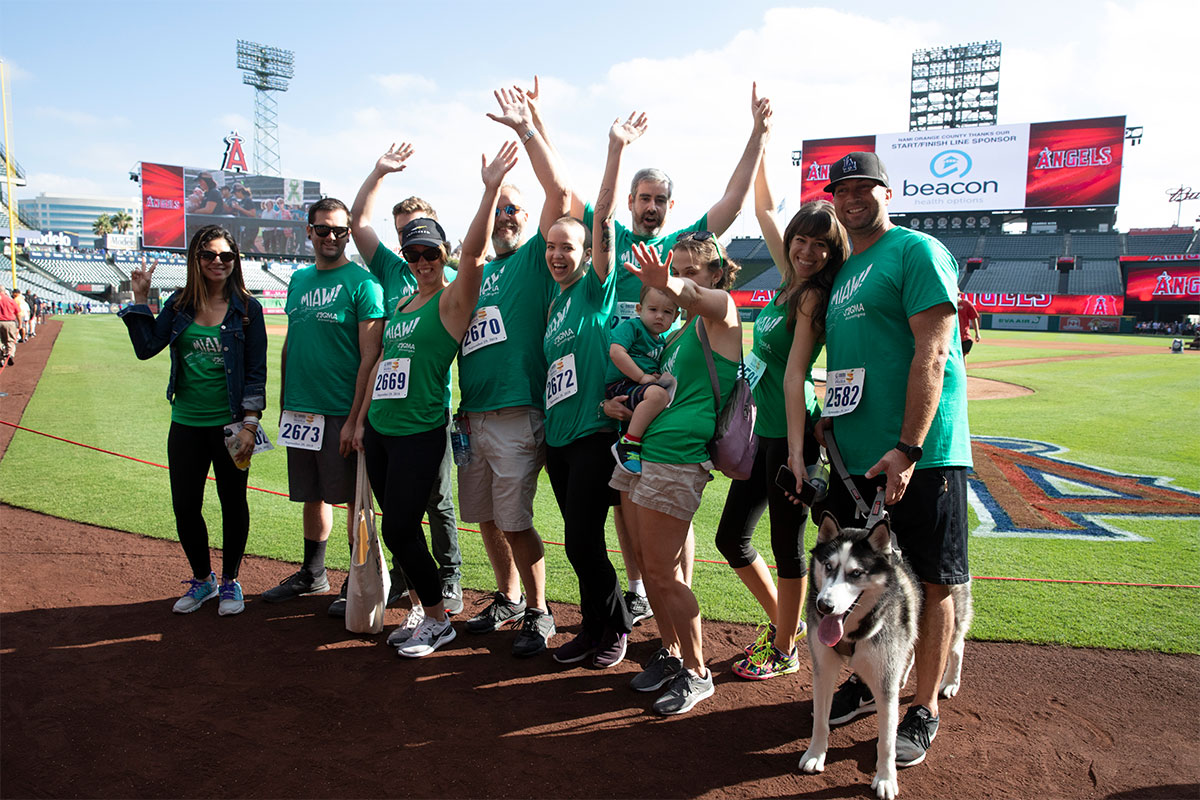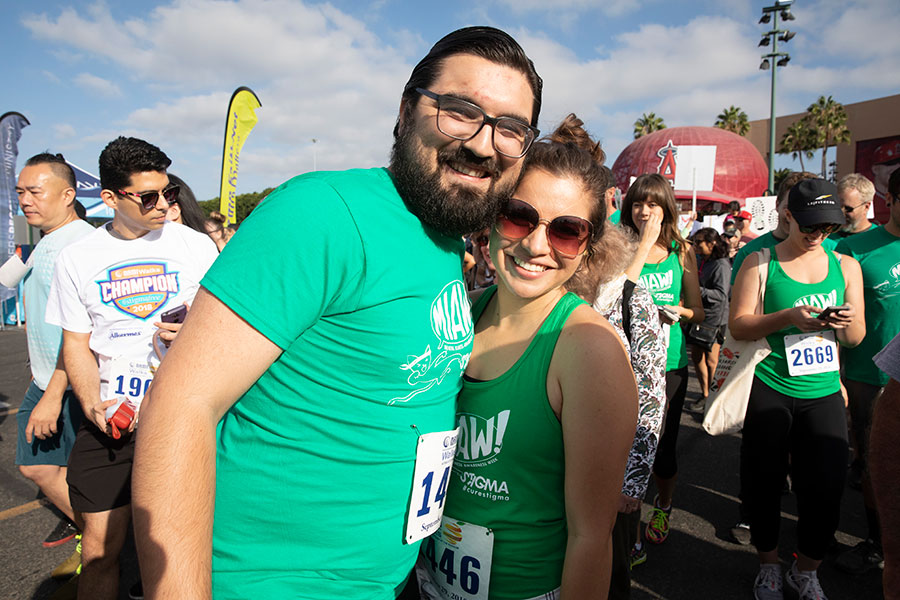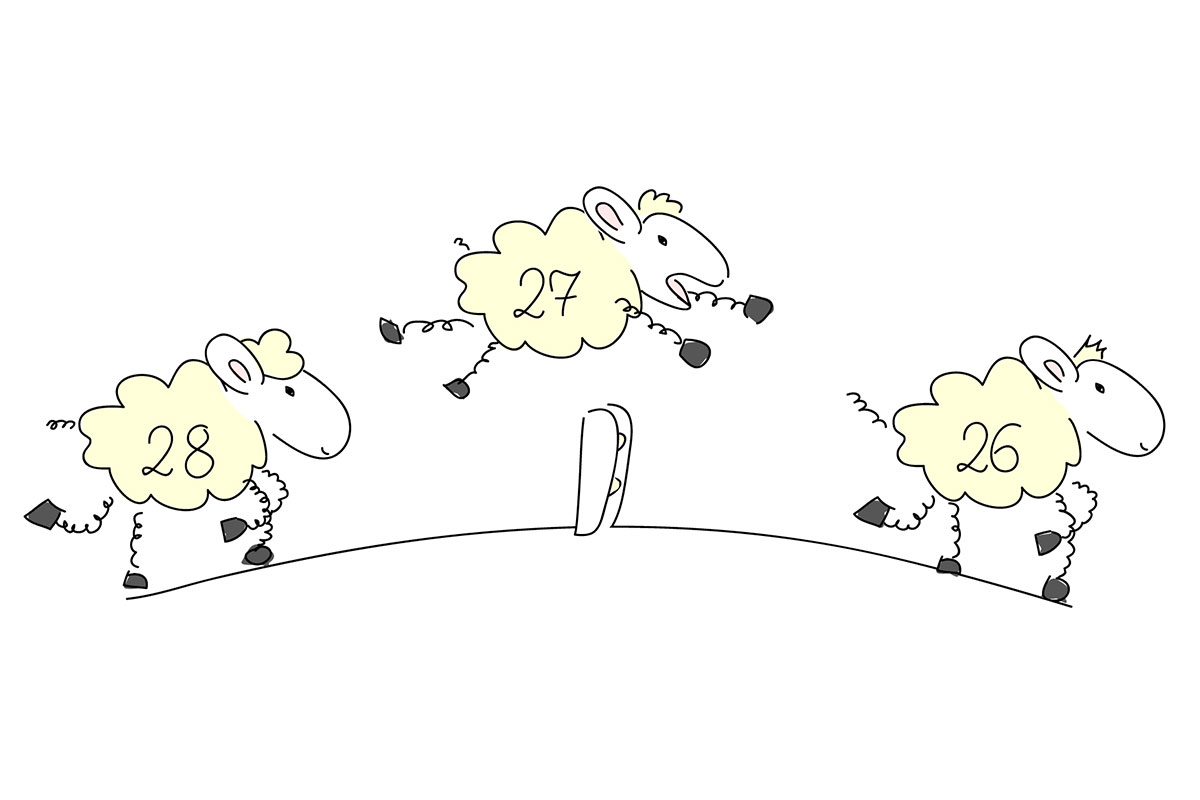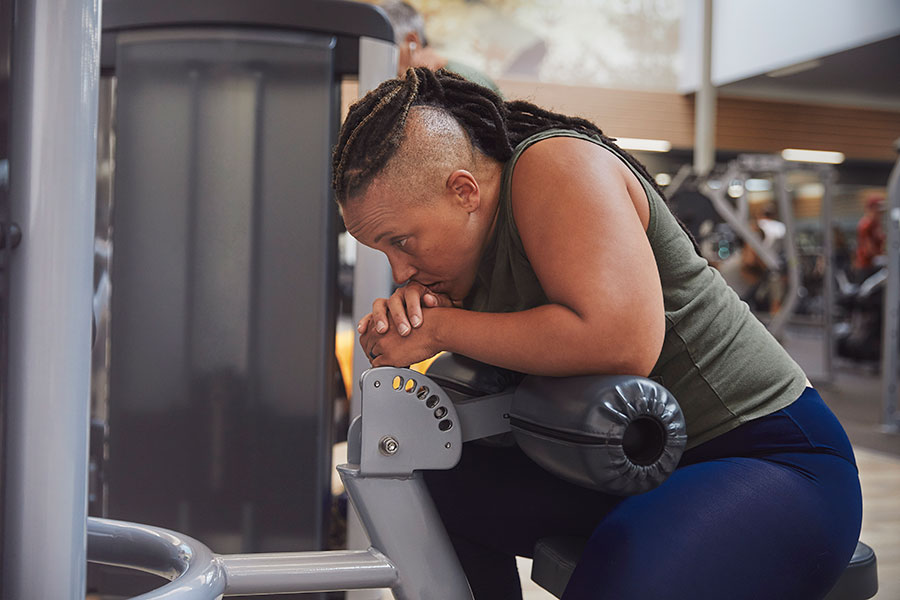How Laughter Improves Your Health
Laughter can encourage blood flow, heighten your immunity, increase your intellectual performance, and even improve your quality of sleep.

On Saturday, September 29th, 2018, LA Fitness participated with NAMI (National Alliance for Mental Illness) and attended their walk at Angel Stadium in recognition of Mental Illness Awareness Week (MIAW). What started off as a small idea turned in to a larger campaign which hoped to bring focus and attention to an often-unspoken topic: mental illness.
The fitness industry does an outstanding job of promoting the benefits of physical activity for a healthier body, but exercise provides many additional benefits for a healthier mind.
Health and wellness can be thought of as the trifecta of physical, mental and emotional wellbeing. A balanced life of healthy eating, sleeping, exercise and time spent doing the things you love with those you love can all lead to a happier self – and who doesn’t want to be happy?
On the day of the event, thousands of people showed up from various organizations to show their support for a great cause. The air was filled with an electric sense of positivity and hope that absolutely radiated in smiles and kind words of fellow walkers.
And for animal lovers out there, there was also a pet costume contest that took place before the walk, meaning there was no shortage of cute dogs to pet and ogle at during the event.
Participants held up signs with various sayings such as “Don’t be ashamed of your story, it will inspire others!” and “We walk, so people will talk”, promoting NAMI’s campaign slogan #CureStigma.
In honor of MIAW, the LA Fitness Living Healthy Podcast published a special episode which featured Neel Doshi, DO, a psychiatrist with Kaiser Permanente Orange County. He helped us better understand the impact exercise can have when added to a treatment plan. If you’re one of the many who deal with anxiety or depression symptoms, you may want to give the episode a listen.
(Listen to it, here!)
Whatever you may be going through may feel overwhelming, but with the proper support group, your journey can feel a lot less lonely.


It’s been such a positive experience to hear from many different people about their relatable struggles with mental illness. It really means a lot to talk about it and remove some of the stigma.
I really enjoyed sharing the walk with my wife and son. It was a great event and the turn out proved that we are chipping away at the stigma that surrounds mental illness.
To see so many people come out to fight the stigma surrounding mental illness was both touching and inspiring. I was so proud to rally behind such a strong force and share such empowerment with my son.


Laughter can encourage blood flow, heighten your immunity, increase your intellectual performance, and even improve your quality of sleep.
Good health starts with good hygiene practices. These 10 common items you encounter in your day-to-day are covered with germs.
For International Women’s Day, we’d like to contribute to the day’s spotlight on women by discussing an important piece of women’s health: mental health.

Welcome to a very special edition of Living Healthy.
On this episode, we speak with Dr. Neel Doshi, DO, a psychiatrist with Kaiser Permanente Orange County, about the importance of mental health and how exercise can act as an additional form of treatment for combating mental illness.
Dr. Doshi is double board certified in Adult Psychiatry and Child & Adolescent Psychiatry by the American Board of Psychiatry and Neurology. Dr. Doshi’s comprehensive treatment approach focuses on an individual’s total health: mind, body, and spirit. He believes that by identifying and addressing underlying causes, implementing healthy lifestyle changes, psychotherapy, and taking medication when necessary, he can determine the best treatment plan and work with his patients to restore their emotional and mental well-being.
If you’d like to share your personal story with us, leave it in the comments section below and use the hashtag #curestigma or send us an email at blog@fitnessintl.com.
This podcast should not replace any exercise program or restrictions, any dietary supplements or restrictions, or any other medical recommendations from your primary care physician. Before starting any exercise program or diet, make sure it is approved by your doctor.
Intro
Begins at 0:01
Psychiatrist Dr. Neel Doshi joins the show
Begins at 0:43
Does Everyone Experience Mental Illness?
1:10
Learn More – NAMI.org
1:54
The Different Categories – AMI vs. SMI
2:22
What Separates a Mental Illness from Just Having a Bad Day?
3:00
The Stigma with Mental Health
4:23
What Are Some Ways You Can Reach Out and Help Others?
5:42
NAMI Cure Stigma Campaign
6:47
Does Mental Illness Come from Genetics?
8:23
The Social Feedback Loop
9:43
The Chemical Side of Things
12:04
How Can the Body Help the Mind – Exercise and Mental Illness
13:53
Neuroplasticity
14:45
The Future of Depression and Anxiety
15:11
Pushing Through to Get Better
16:05
Producer Matt Joins the Show
17:03
Have Patients Had Success with Exercise?
22:55
The Chemical Impact of Exercise – The Legal Drug
23:59
Actionable Advice
26:28
Outro
28:38
Laughter can encourage blood flow, heighten your immunity, increase your intellectual performance, and even improve your quality of sleep.
Good health starts with good hygiene practices. These 10 common items you encounter in your day-to-day are covered with germs.
For International Women’s Day, we’d like to contribute to the day’s spotlight on women by discussing an important piece of women’s health: mental health.


Nighttime approaches, but the Sandman does not. You lay in bed, eyes focused on the ceiling, or perhaps your phone. You set the phone down. Close your eyes. One sheep, two sheep, three sheep, four… no luck.
You’ve been feeling drained, stressed, and unhealthy – maybe your poor sleep habits are to blame.
We reached out to Babak Saedi, MD, and Director of Sleep Medicine at Kaiser Permanente in West Los Angeles, to help us better understand the connection between sleep and weight.
This is what he shared:
Sleep plays a critical role for our physical and emotional health. Without it, we lack the energy necessary to get through the day. Sleep deprivation impacts our immune system, making us more susceptible to illness; it affects our mood and stress levels; it also increases our risk for heart disease. Plus, not getting enough sleep is linked with a number of chronic diseases and conditions, including diabetes, obesity, and depression. While almost everyone feels sleepy in the daytime now and then, sleep debt can affect our concentration and reaction time, becoming the cause of serious problems like car crashes and work-related accidents. Poor sleep is also linked to increased pain perception and a degraded quality of life.
Adults need seven to eight hours of sleep and kids – depending on their age – need between eight to eleven hours.
In order for us to achieve any health or fitness goal, we must make sleep a priority. Whether we want to maintain or lose weight, gain muscle mass, perform better or simply feel better, getting enough high-quality sleep is key to reaching our weight and fitness goals.
If you’re tired, you have less energy. Even if you can get yourself to workout, the intensity of that workout isn’t the same as when you’re well rested, and as a result, you burn less calories.
You’re more likely to eat more and consume extra calories from high fat and high sugar foods to cover the energy cost of staying awake.
Lack of sleep impacts our hunger (ghrelin) and satiety (leptin) hormones. It also causes a spike in our cortisol levels, signaling our body to conserve energy to fuel our waking hours.
It affects our body’s ability to properly respond to insulin signals. Excess insulin increases the storage of fat in fat cells and prevents fat cells from releasing fat for energy.
Lack of sleep slows the production of growth hormone, which can make it more difficult for your body to build muscle mass.

1. Take a hot shower 1-2 hours before bedtime.
2. Make your sleeping environment comfortable. The temperature, along with light and noise should be controlled to make the bedroom conducive to sleeping. It’s also important to choose a comfortable and supportive mattress and pillow.
3. Go to bed only when sleepy. Once in bed, if you cannot fall asleep after 20 minutes, leave the bedroom for another room. After getting up, it’s important to remain calm, which means avoiding bright-lights or engaging in activities that will lead to more alertness (including chores or games on the computer, phone or tablet). Return to bed once you feel sleepy. Until then, stay out of the bedroom.
4. Limit bedroom activities to only sleeping and intimacy. Avoid watching television, using electronics, playing games or studying while in bed. Also, avoid clock watching. All of these activities increase alertness and make it difficult to fall asleep.
5. Avoid eating or drinking right before going to bed. Eating a late dinner or snacking before going to bed can activate the digestive system and keep you awake. Eating before bedtime can also worsen acid reflux or heartburn symptoms. Avoid drinking too much before bedtime because it can cause the need to urinate frequently throughout the night.
6. Avoid smoking, caffeinated beverages, alcohol and other stimulants. The effects of caffeine, alcohol, and nicotine can last several hours after use, which cuts into sleep time. Caffeine can cause difficulty falling asleep and frequent awakenings, while alcohol is known to create a non-restful night’s sleep and frequent urination.
7. Avoid daytime naps. It is important to establish and maintain a regular sleep and wake-up pattern. Napping during the day, especially after 2 p.m., makes it difficult to fall asleep at bedtime. If one must take a nap during the day, it should be early, around midday, and should only last about 20 minutes.
8. Exercise regularly. Regular exercise can improve sleep quality and duration. However, avoid exercising close to bedtime because it can have a stimulating effect on the body. Try to finish exercising at least three hours before it’s time to sleep.
9. Wake up the same time each day. Waking up the same time every day regardless of how much sleep you’ve had helps to regulate your internal clock (circadian rhythm) and predict your bedtime. Try to keep the same sleep and wake-up time on work/school and non-working/school days, especially if you are a shift-worker.
10. Set aside time to plan. If you find that you lay in bed thinking about tomorrow, consider setting aside a time at night to review the day and make plans for the next day. The goal is to avoid doing these things while trying to fall asleep. It may also be helpful to make a to-do list.
11. Reduce Stress. Aim for two hours of relaxation time before bedtime. There are a number of relaxation therapies and stress reduction methods to relax the mind and body before going to bed. You may want to take a warm bath, do some light reading, listen to white noise or relaxing audio tapes, do some deep breathing exercises or practice meditation.
Responses and tips above provided by Babak Saedi, MD, and Director of Sleep Medicine at Kaiser Permanente in West Los Angeles. Questions provided by Mayra Suarez, Senior Media Relations Representative at Kaiser Permanente Southern California.
Laughter can encourage blood flow, heighten your immunity, increase your intellectual performance, and even improve your quality of sleep.
Good health starts with good hygiene practices. These 10 common items you encounter in your day-to-day are covered with germs.
For International Women’s Day, we’d like to contribute to the day’s spotlight on women by discussing an important piece of women’s health: mental health.

Welcome to the 9th episode of the Living Healthy Podcast, presented by LA Fitness.
On this episode of Living Healthy, we speak with LA Fitness Master Trainer, Geoff Fox, and get his advice on persevering even when you feel like quitting.
How Are We Doing?
This podcast should not replace any exercise program or restrictions, any dietary supplements or restrictions, or any other medical recommendations from your primary care physician. Before starting any exercise program or diet, make sure it is approved by your doctor.

Introduction
0:01
Show Begins
0:20
Master Trainer, Geoff Fox Joins the Show
Begins at 1:38
Why Do We Quit?
Begins at 1:51
Biggest Culprit Leading People to Quit
Begins at 2:39
Plateaus
Begins at 3:26
Learning to Move Forward
Begins at 6:54
Working Out with Others
Begins at 11:07
Changing Your Thinking
Begins at 13:05
Embrace the Struggle
Begins at 16:38
Ask a Trainer Throwback Break
Begins at 19:39
Actionable Advice
Begins at 21:28
Laughter can encourage blood flow, heighten your immunity, increase your intellectual performance, and even improve your quality of sleep.
Good health starts with good hygiene practices. These 10 common items you encounter in your day-to-day are covered with germs.
For International Women’s Day, we’d like to contribute to the day’s spotlight on women by discussing an important piece of women’s health: mental health.

Let’s start with the facts.
Statistically speaking, you have a greater chance of getting struck by lightning than winning the lottery. (Almost 4 times more likely, actually).
Still, chances are you’ve tried your luck at it a time or two –
So, why not take a gamble on yourself? Whether it’s fear of failure, lack of motivation, or countless other reasons that have held you back from hitting the jackpot on your life, let’s make the conscious decision to cross that bridge together today.
Unlike the lottery, when it comes to fitness and nutrition the odds are in your favor.
I’m sure some would argue this point, but here’s why it’s true:
There could be a million reasons not to start something, but if you can find one reason to begin that’s all you need.
That small step in the right direction is your way of taking control of your life and getting one step closer to winning life’s jackpot.
If someone else could win the lottery, why can’t you? If someone else could turn their health and fitness around, why can’t you?
You can do it and if you feel like you can’t, LA Fitness will help you get there. Try us out and see what you think. And if you’re already a member who is struggling to stay on track, talk to a Pro Results® certified personal trainer for what the best option would be for you.
Taking chances can be scary, but taking a chance on yourself could be the greatest gamble you ever make.
Need a little extra motivation? Check out some of the additional articles below.

Laughter can encourage blood flow, heighten your immunity, increase your intellectual performance, and even improve your quality of sleep.
Good health starts with good hygiene practices. These 10 common items you encounter in your day-to-day are covered with germs.
For International Women’s Day, we’d like to contribute to the day’s spotlight on women by discussing an important piece of women’s health: mental health.
Be the first to know about exclusive
content, deals and promotions